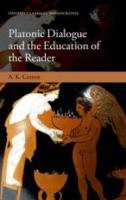
OUP (2014) h/b 330pp £73 (ISBN 9780199684052)
Plato, everyone knows, is an idealist, and a philosophical dualist. Mind and body are separate; mind is king; only ideas count; the body is a prison of the soul; the emotions are not to be trusted … the list goes on.
This reviewer proposes that if one accepts the arguments laid out in this book, then ‘everyone’ may in fact be wrong. Yes, Plato is of course a philosophical idealist—but the whole person is involved in the noble quest for enlightenment and true knowledge; and far from being an obstacle, the body, with its concomitant emotions, is a vital partner and participant in the seeking after truth.
The book made a very profound impact on this reviewer, not just because it was—is—a fascinating study, but because at every point, one is left with the lasting impression that this is someone who has listened to what Plato wanted to say, rather than trying to understand him from a pre-determined perspective. It makes the book a very exciting read.
C. argues that the purpose of Plato’s dialogues is to help us, the readers, to undergo the same intellectual and emotional experience of learning as that of Socrates’ interlocutors. The twists and turns of the dialogues, and the dead ends and changes of direction, all play their part in stimulating us to work out what we think, and why.
The differences between ‘early’, ‘middle’ and ‘late’ dialogues are, then, procedural rather than philosophical; Plato assumes that people at a different stage of philosophical development need different types of stimulus. And this in turn means that at each stage, it is the dialogue itself which plays for the reader the same role as Socrates plays for his interlocutor in the dialogues. As C. says, ‘the contribution that we as readers are required to make to [the] process means that [the] arguments become ours, not the text’s.’ The point, then, is the development of the reader.
So in the early dialogues, the reader experiences the frustrations (aporiai), incredulity and anger of the interlocutors, confirming their ignorance (the essential start for any philosopher); in the middle period, the reader is, like the interlocutors, left more on his own to work out what is going on; and by the time of the later period, ‘the most interesting dialectical activity is taking place in the reader’s interaction with the dialogue, not among the interlocutors portrayed with it—and it need be no less exciting for being invited by, rather than represented in, the text.’
This reviewer found particularly illuminating C.’s emphasis on the emotional aspect of philosophising. Take her discussion of the Cave metaphor in Republic. She observes that, when leaving the cave, the prisoner is the key player, not Socrates, and he is driven by experiences of both pleasure and pain. ‘Desire and aspiration, then, play an important part in the prisoner’s upward movement.’ As, of course, they do in ours; and it is Plato’s intention, C. believes, to stimulate those feelings of desire and aspiration in us through our engagement with his writings.
So the dialogues are not textbooks, but stimuli. Aesthetic considerations like disruption and the consequent desire for resolution are extremely important. It is the reader who creates the philosophical unity, not the author. And this takes time, much iteration, and a great deal of hard work. But, just as an unresolved harmony in a symphony makes one yearn for the resolution, so Plato’s deliberate digressions, interruptions, false starts, dead ends, etc., make the reader more intensely desirous of philosophical resolution.
C. offers a fascinating analogy with the Platonic Forms. The philosopher has to understand that the Idea of e.g. the One Perfect Table ‘cannot belong to any [particular example of an] object in the everyday world. It can only be created by the reader through a long process of reflection; and what matters is not the form of a work, but our ability to make sense of it through our own effort.’ This is, of course, the cognitive side of the philosophical journey.
There are some quite fascinating sections on the relationship of Plato’s work to literature—particularly tragedy—and some illuminating observations about the role of choice and how one knows how to make the right choice. This, then, takes C. to the civic and political aspects of Plato’s dialogues. She observes that Plato isn’t (as so many commentators have believed) ‘against’ civic affairs and seeking to flee into philosophy, but that he wants to equip us with the tools to understand what is really going on, so that we may engage in a responsible and informed way. The setting of Theaetetus against the backdrop of the law-courts suggests that ‘the shared purpose of philosophising and the law courts [is] the pursuit of truth and the ability to distinguish what is real from what is false.’
This book is truly a tour de force for anyone with a deep interest in Plato. It is not for the faint-hearted; but as an example of humane, sensitive and creative scholarship, it can surely rarely have been bettered.
Jeannie Cohen
